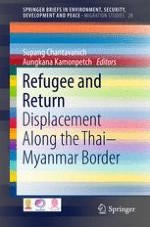This book provides essential background information on the protracted displacement of several ethnic groups along the Thai-Myanmar border before turning to an examination of whether Myanmar has now shifted into a post-conflict society, the expected challenges involved in reintegrating returnees to Myanmar, and the possibility of voluntary and sustainable repatriation. The authors conclude that, given the current, ongoing security challenges and the lack of job opportunities in Myanmar, voluntary repatriation is not yet feasible as a long-term solution. After more than 60 years of conflict and displacement, Myanmar is now in the midst of political reform. A new nominally civilian government and the promise of elections in 2015 have raised hopes of a lasting democratic transition after years of military rule. For the first time in decades, repatriation of refugees in Thailand is being discussed as a real and imminent possibility.
